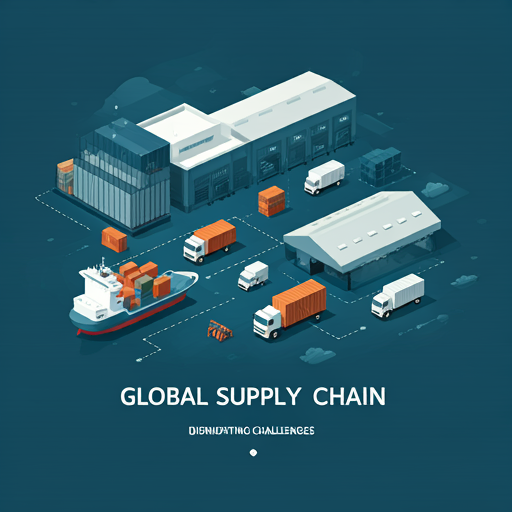Navigating the Global Supply Chain Disruptions
Understanding Supply Chain Disruptions
Here are 10 trending article titles for a financial website based on the latest news and analysis:
The Role of Cryptocurrency in Supply Chains
Impact of COVID-19 on Global Supply Chains
Immediate Effects on Trade and Logistics
COVID-19 has significantly disrupted global trade and logistics. Supply chain bottlenecks have emerged due to factory shutdowns. These shutdowns have led to reduced production capacity. Consequently, delays in shipping have become common. Many companies have faced increased shipping costs. Higher costs can erode profit margins. Additionally, transportation networks have experienced severe congestion. This congestion has further complicated delivery schedules. It is a challenging environment for businesses. Companies must adapt quickly to survive.
Long-term Changes in Supply Chain Strategies
The COVID-19 pandemic has prompted significant shifts on supply chain strategies. Companies are increasingly prioritizing resilience over cost efficiency. This change is essential for managing future disruptions. Many organizations are diversifying their supplier bases. A diverse supplier network reduces dependency on single sources. Additionally, businesses are investing in technology for better visibility. Enhanced visibility allows for real-time tracking of goods. This capability improves decision-making and responsiveness. Companies must embrace these long-full term changes. Adaptation is crucial for sustained success.
Geopolitical Factors Influencing Supply Chains
Trade Wars and Tariffs
Trade wars and tariffs significantly impact global supply chains. They create uncertainty in international markets. This uncertainty can lead to increased costs for businesses. Key factors include:
These elements can alter sourcing strategies. Companies may seek alternative suppliers to mitigate risks. This shift can lead to higher operational costs. It is a complex landscape for decision-makers. Strategic planning is essential for navigating these challenges.
Political Instability and Its Effects
Political instability can severely disrupt supply chains. It creates an unpredictable environment for businesses. Key effects include:
These factors can lead to higher costs and delays. Companies may need to reassess their sourcing strategies. A diversified supplier base can mitigate risks. This approach enhances resilience against disruptions. Understanding these dynamics is crucial for effective planning. It is vital to stay informed about geopolitical developments.
Technological Innovations in Supply Chain Management
Blockchain Technology and Transparency
Blockchain technology enhances transparency in supply chain management. It allows for real-time tracking of products. This capability reduces the risk of fraud and errors. Additionally, all transactions are recorded immutably. This feature ensures accountability among all parties involved. Companies can verify the authenticity of goods easily. Such transparency builds trust with consumers. It is a significant advancement for the industry. Businesses must consider adopting this technology.
Smart Contracts and Automation
Smart contracts facilitate automation in supply chain processes. They execute predefined conditions without human intervention. This capability reduces the potential for errors and delays. Additionally, smart contracts enhance efficiency by streamlining transactions. They can automatically trigger payments upon delivery confirmation. This feature improves cash flow management for businesses. Furthermore, the use of smart contracts increases compliance with regulations. It ensures that all parties adhere to agreed terms. Companies should explore these innovations for competitive advantage.
Cryptocurrency as a Solution for Supply Chain Issues
Facilitating Cross-Border Transactions
Cryptocurrency facilitates cross-border transactions by eliminating intermediaries. This reduction in intermediaries lowers transaction costs significantly. Additionally, cryptocurrencies enable faster transfers across different currencies. Traditional banking systems often impose delays and high fees. With cryptocurrency, businesses can transact in real-time. This capability enhances liquidity and cash flow management. Furthermore, blockchain technology ensures secure and transparent transactions. It minimizes the risk of fraud and disputes. Companies should consider integrating cryptocurrency into their operations. It is a viable solution for modern supply chain challenges.
Reducing Transaction Costs and Time
Cryptocurrency can significantly reduce transaction costs in supply chains. By eliminating intermediaries, businesses save on fees. This efficiency leads to faster processing times. Traditional payment methods often involve lengthy settlement periods. In contrast, cryptocurrency transactions can be completed in minutes. This speed enhances operational efficiency and cash flow. Additionally, the use of smart contracts automates payment processes. Automation minimizes human error and delays. Companies should evaluate the benefits of cryptocurrency adoption. It is a strategic move for cost-effective operations.
Future Trends in Supply Chain and Cryptocurrency
Emerging Technologies and Their Impact
Emerging technologies are reshaping supply chain dynamics. Innovations such as artificial intelligence and blockchain enhance efficiency. These technologies enable predictive analytics for better decision-making. Improved forecasting can reduce inventory costs significantly. Additionally, automation streamlines operations and minimizes human error. This shift leads to faster response times in the market. Cryptocurrency integration further facilitates seamless transactions. It allows for real-time payments across borders. Companies must adapt to these trends for competitive advantage. Staying informed is essential for future success.
Predictions for the Next Decade
In the next decade, supply chains will increasingly adopt blockchain technology. This shift will enhance transparency and traceability. Companies will likely implement more automated systems. Automation will reduce operational costs and improve efficiency. Additionally, cryptocurrency usage for transactions will rise. This trend will facilitate faster cross-border payments. Businesses must prepare for these changes. Adaptation is crucial for maintaining competitiveness.
